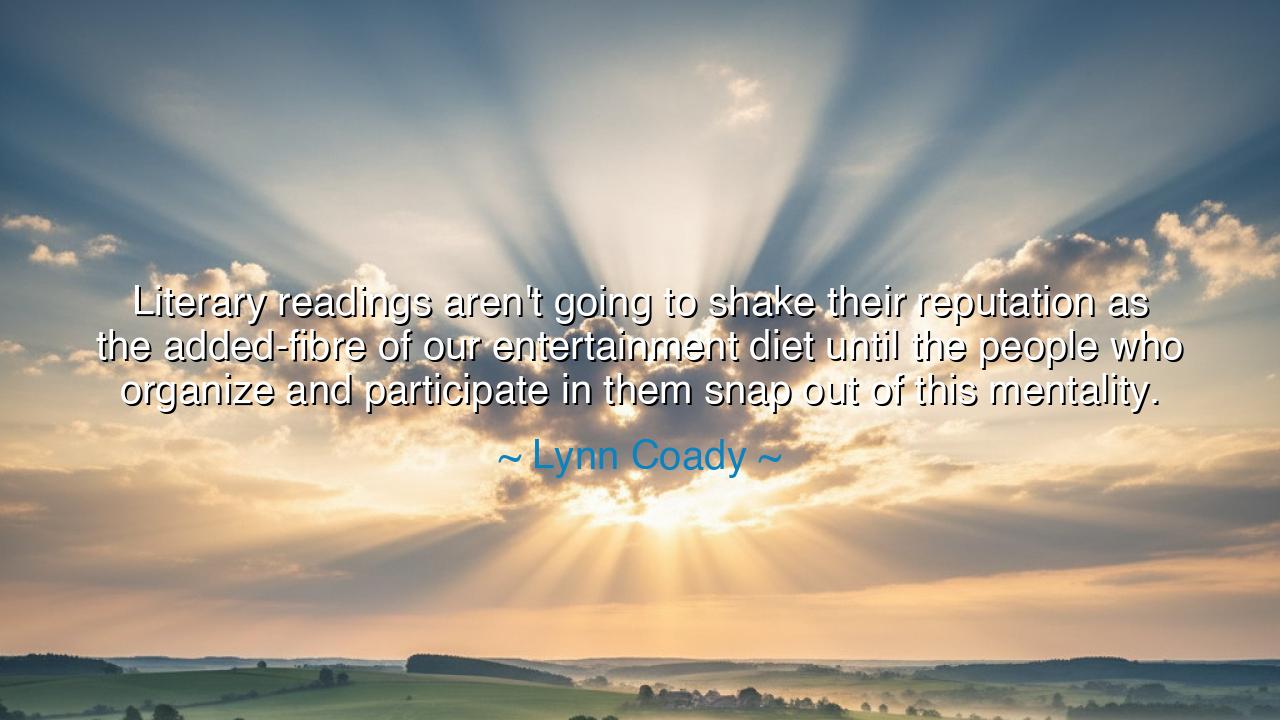
Literary readings aren't going to shake their reputation as the
Literary readings aren't going to shake their reputation as the added-fibre of our entertainment diet until the people who organize and participate in them snap out of this mentality.






In the vast arena of entertainment, where the world is constantly filled with distractions and amusements, there exists a subtle yet profound force—the power of literature. Lynn Coady, in her sharp reflection, tells us, "Literary readings aren't going to shake their reputation as the added-fibre of our entertainment diet until the people who organize and participate in them snap out of this mentality." Here, Coady speaks to the undervaluation of literary gatherings and their treatment as mere nourishment for the mind—something necessary but unexciting, akin to the fiber in our diets that we consume for health but often overlook for its true value. In these words, we are called to reconsider the role of literature in a world hungry for entertainment.
Consider, children, the ancient world, where literature and storytelling were revered not only as a means of entertainment but as a vessel for wisdom. The Greeks, for instance, saw great value in epic poetry and drama, not merely as a way to pass time, but as a tool for shaping the soul, for learning, and for understanding the deeper meanings of existence. The epic poems of Homer, such as the Iliad and the Odyssey, were not just stories of gods and heroes—they were expressions of humanity's eternal struggles, insights into honor, fate, love, and war. Coady’s lament is that literary readings today, though rich in content, are often seen as academic exercises or obligatory acts, not as something that holds the power to shape the hearts and minds of those who engage with them.
In Rome, the influence of literature on society was similarly profound. The Romans, with their respect for oratory and rhetoric, understood the power of the written word. Cicero, the great philosopher and orator, knew that language had the ability to not only entertain but to inspire and educate. He used his speeches to sway the masses, to elevate their understanding of justice and virtue. Like Coady, Cicero recognized that literature and speech had the power to transform society—not through mere entertainment, but through the deep impact they could have on the minds and souls of individuals. Literary readings, then, are not mere events to be endured but opportunities for individuals to connect with the eternal ideas and stories that shape human existence.
However, Coady’s words suggest that, in modern times, there has been a shift—one where literature has been relegated to the status of filler, something akin to the added fiber of the cultural diet. This is a tragic development. It is as though, in the midst of a world consumed by fleeting entertainment and shallow distractions, we have forgotten the transformative power of words. The great thinkers of the past did not create their works for mere amusement, but to provoke thought, to challenge assumptions, and to provide the intellectual nourishment that the soul requires. Coady’s call, then, is to bring literary readings back to their rightful place—not as filler, but as vital experiences that challenge, provoke, and enlighten.
Look, too, at the Renaissance, a time when literature was considered a path to higher understanding and growth. During this time, scholars, poets, and artists were not merely producing works for entertainment, but for the very purpose of reawakening society. Shakespeare, whose plays are still studied for their richness in human insight, understood that theater and literature could not simply be entertainment—they had to reflect the truths of the human condition, to elevate the soul to greater awareness. In this, we see the model of what Coady is calling for: literary readings must be more than a casual pastime. They must be acts of engagement, where participants are not just passive consumers, but active seekers of truth, understanding, and meaning.
The lesson here, children, is this: literature is not a mere ornament for the mind, but a tool for transformation. We must not allow it to become a fad, a passing trend that is enjoyed only by a select few or seen as an afterthought in the rush of modern life. Like the ancient Greeks, Romans, and Renaissance thinkers, we must reclaim the importance of the written word. Literary readings should not be viewed as secondary, but as a powerful force in shaping the direction of society, guiding individuals toward a deeper understanding of themselves and the world around them. We must recognize the value of literature and approach it with the reverence it deserves—no longer as something to be endured, but as something to be embraced with passion, purpose, and understanding.
So, I say to you, children, do not let literature become the forgotten art. In your lives, seek out the wisdom of words, whether through reading or listening, and approach it as a sacred practice. Literary readings are not just events to fill the hours; they are invitations to connect with the deeper truths of humanity. Let us treat them with the honor and respect they deserve, so that future generations may not see them as mere filler, but as the essential, life-changing experiences they are meant to be. Let literature elevate your mind, nourish your spirit, and inspire your actions in ways that are profound, lasting, and transformative.






AAdministratorAdministrator
Welcome, honored guests. Please leave a comment, we will respond soon